Women's March: What's changed one year on?
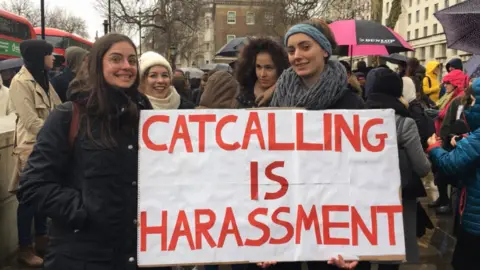 BBC
BBC"Time's up, time's up" was the message continuously chanted by thousands of protesters gathered in London to support a rally highlighting women's rights.
It came a year after millions of people took to the streets around the world for the first Women's March, held on the first full day of Donald Trump's presidency.
As Mr Trump marks his first year as US president, more demonstrations are being held across the US and cities across the UK, including the one outside Downing Street.
It was also part of the Time's Up campaign to end sexual harassment, launched at the start of 2018 by hundreds of women, predominantly American and British, in the entertainment industry.
Although the numbers in London were fewer than last January, what did people think of progress in women's rights one year on?
The thousands braving the wintry conditions were there for a variety of reasons.
"Women's rights are human rights", "dump Trump" and "this is not a moment, it's a movement" were just some of the hundreds of slogans.
The crowd spilled out onto the road to hear speeches from activists, including the great-granddaughter of suffragette Emmeline Pankhurst.
Amongst the crowd was Lisa Hughes, who had brought her eight-year-old daughter Annabelle along.
Ms Hughes, from London, said last year's action was having a lasting impact "by raising consciousness around the world of issues affecting women".
She said: "It made people sit up. It's empowered more women to come out and protest and stick up for their rights."
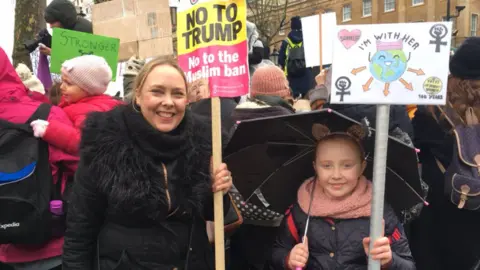
Annabelle said she had been keen to come to the demonstration for a second year running.
She said: "Women should be treated more equally. It doesn't matter about the gender - they're just people".
A sixth-form teacher, Ms Hughes said she felt it was important that young people got involved.
She said: "I'm a history teacher so women's empowerment and equality is something that's really dear to my heart. It's something that I really encourage in my female students at school.
"It's really important for my daughter to be here today to be protesting against all the inequality that still exists all around the world - which is why the sign has a picture of the globe on.
"It isn't just about her, it's about women everywhere.
"I really feel strongly that this whole campaign has been triggered by Donald Trump's presidency."
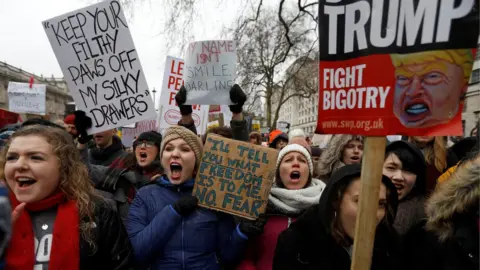 Reuters
ReutersThe US president was a recurring theme at the event, organised by Women's March London, especially among the many Americans in the crowd.
Many banners and placards voicing their opposition to Mr Trump were visible - while his name was roundly booed at every mention.
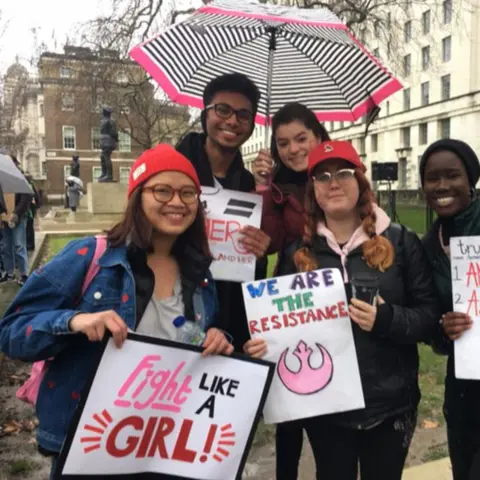
US student Amelia Lampard, who attended with four friends - two American, one Indonesian and one from Abu Dhabi, said Trump's presidency was her main reason for coming.
She added: "It just covers a lost of issues under one umbrella. I think today is really important for that."
The 22-year-old said she thought the large numbers of people turning out in support of women's issues had been inspiring.
She said: "Last year I think had a huge impact. Even if you didn't go, just watching that you were like 'women can really do that'. I think that's cool to see."
Yuvan Shankar, 18, from Abu Dhabi, said he had joined his female friends at the protest because it affected everyone.
"If we hold an entire gender back, it's not good for anyone," he said.
There were a large number of young faces visible in the crowd, listening to speakers talking about issues ranging from domestic violence to climate change.
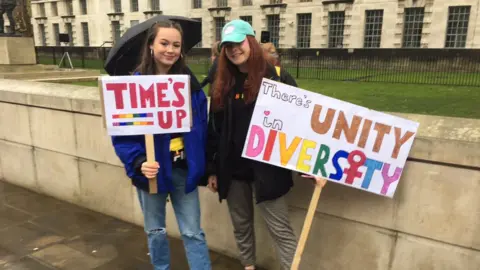
Many of those present, like 16-year-old student Carys Owen, from Sutton in south London, were inspired to join in after the success of the marches in 2017.
She said: "I wasn't able to come last year and I was really disappointed by that.
"So I wanted to come this year to show support for the Time's Up campaign and any sexual assault victims, as well as all of the other campaigns that are being supported here today.
She said hearing about the abuse suffered by many of the US gymnastics team had particularly affected her.
Her friend Cerys Roberts, 18, said there was a growing awareness among young people about the need to attend rallies like this.
"In young people there's definitely a push to come and show our support," she said.
"The majority are female friends but I do have a few male friends that wanted to come and support it.
"I think the impact is more in the minds of people, instead of an actual legislative change.
"People feel empowered by it and then from that they are more likely to join an organisation and do other things to support a policy.
"So maybe there's not an official change in Parliament, but I do think that women feeling empowered is a really important part of our march to equality."
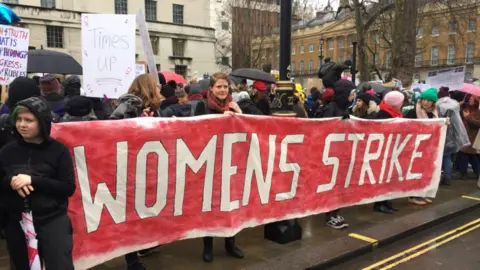
Australian-born researcher Ava Caradonna was with a group of women who are part of an international movement planning a day of action on 8 March.
She said the last 12 months of demonstrations and growing public awareness has made her "a lot more confident".
The 37-year-old, who lives in London, said: "I feel like people have more confidence - they're really angry and they're not going to be shamed for speaking out about the experiences of sexual harassment.
"I think there's a gender revolution going on and it shows no sign of abating.
"People have been awakened around the idea of collective action and the need for women to fight for the very few rights we have at the moment.
"Women are connecting a few of the issues together - it's not just about gendered rights."
Allow Instagram content?
British singer Adele, alongside Hollywood actresses Cameron Diaz and Jennifer Lawrence, joined thousands who took part in the Women's Marches in the United States on Saturday on the anniversary of Mr Trump's inauguration as US president.
She shared a photo of the trio in Los Angeles on Instagram, where she paid tribute to women.
She wrote: "The most influential people in my life have always been women. My family, my friends, my teachers, my colleagues, and my idols.
"I am obsessed with all the women in my life. I adore them and need them more and more every day."
